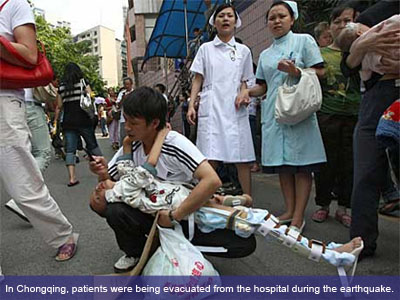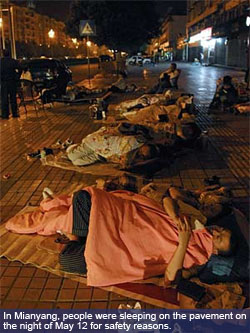
Original article: [Chinese]
As of 23:55 on May 12, the death toll from the magnitude 7.8 earthquake in Wenchuan county of Sichuan province had risen to around 9,000.
The number is likely to grow as information continues to trickle in. Local traffic and communication networks have been interrupted.
Nine and a half hours after the earthquake happened, EO reporters have rushed down to Chengdu, 92km southeast of the epicenter.
Currently the only way to access Wenchuan is?by helicopter, as roads leading to the county has been blocked by a landslide in the Dujiangyan stretch.
The earthquake shook many regions in China, from nearby Chengdu and Chongqing to as far as Beijing.
At 17:30 on May 12, the EO reporters arrived at the Chongqing Railway Station, where a great number of passengers were stranded. The train the reporters had planned to take, T898 heading for Chengdu at 17:50, was cancelled.
The police were maintaining order at the train station, where the EO learned that all trains were cancelled due to unknown reasons caused by the quake. According to railway staff, the cancellation might be caused by rail track distortion.
As the railway link proved impossible, the EO reporters immediately headed to the Chenjiangping bus station of Chongqing and managed to get a ticket to Chengdu at 19:00. Most of the crowds at the station were traveling to cities close to the epicenter including Chengdu, Wenchuan, Mianyang, and Deyang.
Hu Jia (a pseudonym), a newly-wed, said his wife had just started working in Wenchuan three months before. "I couldn't reach her by phone at all. In the afternoon we were still chatting on QQ, and suddenly we lost contact. I felt the strong tremors too," he said.
"How would I have imagined that Wenchuan was the epicenter?" Hu said, tears welling up in his reddened eyes, adding:"I've only been there once. I know it is the place to access into Tibet and it's adjacent to Beichuan. The population there is about 800,000."
According to the locals in both Chongqing and Chengdu, all text messages and phone calls were blocked right after the quake, and everybody ran into the streets, flush with panic and fear.
In some high-rises in Chongqing, the security guards forbade entry. Despite this, the streets remained orderly and structures stayed intact.
In Chengdu, the quake impact was more severe.
"At home, the water cooler toppled and the wardrobe moved to a different location due to the strong vibration,"a resident from Chengdu named Hu said by phone. She added her family planned to leave their apartment in Chengdu and head to the rural area where there were no high-rises.  On the way to Chengdu, the reporters did not experience traffic congestion on the highway and reached the city around 23:00 on May 12. Once entering the city limits, there was more traffic flow and people were seen gathering in open spaces. Many residents were seen camping openly in the parks or pedestrian walkways, they were only equipped with thin mattresses and blankets.
On the way to Chengdu, the reporters did not experience traffic congestion on the highway and reached the city around 23:00 on May 12. Once entering the city limits, there was more traffic flow and people were seen gathering in open spaces. Many residents were seen camping openly in the parks or pedestrian walkways, they were only equipped with thin mattresses and blankets.
The EO learned from the local government that even at that hour, the earthquake emergency warning was still being enforced and everyone remained vigilant. The six television networks in Chengdu provided 24-hour coverage on the latest development from earthquake scenes.
Ambulances could be seen stationed in down town areas of Chengdu, such as near the Dongfeng Bridge bus stop next to a park, where many residents camped out the night.
Upon hearing that huge number of deaths and injured had been registered in the nearby Beichuan county, the public camping in the park had voluntarily approached the ambulances to donate blood for earthquake victims.
Chengdu Seismological Center's spokesman assured the public that building structures in the city could defend against earthquake up to 6 on the Richter scale.
The center also disclosed that Chengdu had experienced numerous tremors after the initial earthquake, the most serious of which?measured 5.6 on the Richter scale.
Soon after the earthquake occurred, communication networks in the city temporarily broke down, however, the municipal government immediately kept the people informed via public broadcast.
By the time this report was submitted, it was already close to 2am on May 13. By then, the city had calmed down relatively, as those camping out in the open had embraced sleep under the watchful eyes of the police and ambulances standing by.
Background Information:
Wenchuan county is located in the northwest part of Sichuan province. It has a population of 105,436, comprising of Qiang, Zang (Tibetan) and Hui minorities and Han peoples. It is part of the Aba autonomy area for the Zang and Qiang minorities.
Timeline for the Earthquake in Wenchuan:
14:28, May 12 -- A violent earthquake measuring 7.8 on the Richter scale struck Wenchuan
20:00, May 12 --?Chinese Premier Wen Jiabao arrived at Dujiangyan to oversee the rescue work.
The night of May 12 – Chinese President Hu Jintao held an emergency meeting to map out strategy for the rescue work.
The night of May 12 -- The Civil Affairs Ministry appropriated 200 million yuan for relocation of affected residents in quake-stricken areas. The Health Ministry has dispatched a dozen of medical teams to Sichuan province.
23:40, May 12 --?A professional rescue team comprising of over 200 rescue staff?sent?to?quake-stricken areas.
06:30, May 13 -- A total of 16,760 soldiers were engaged in the rescue work and another 34,000 were on the way to quake-stricken areas.
07:00, May 13 -- The quake has estimated killed 9,219 and devastated 500,000 houses. The death toll is expected to climb as rescue efforts intensified.?
- 孤兒身份正在核實(shí) 尚不具備辦理收養(yǎng)條件 | 2008-05-21
- “5.12地震”四川圖集 | 2008-05-21
- Chinese Solidarity to Stay off Amusement | 2008-05-21
- 中國大企業(yè)的責(zé)任 | 2008-05-21
- Guangdong CDC Bribery Case Under Lock and Key | 2008-05-21











